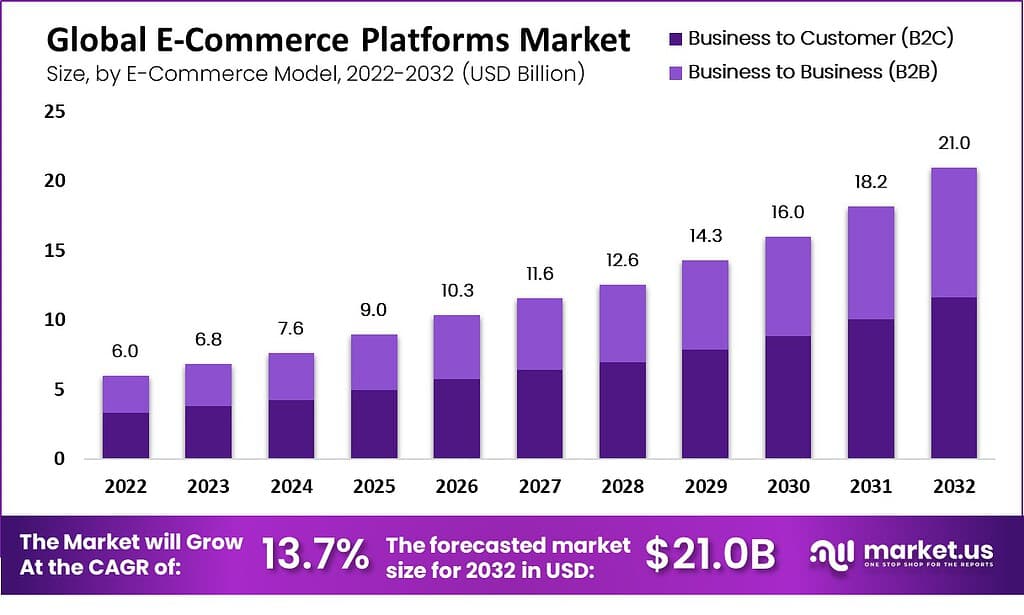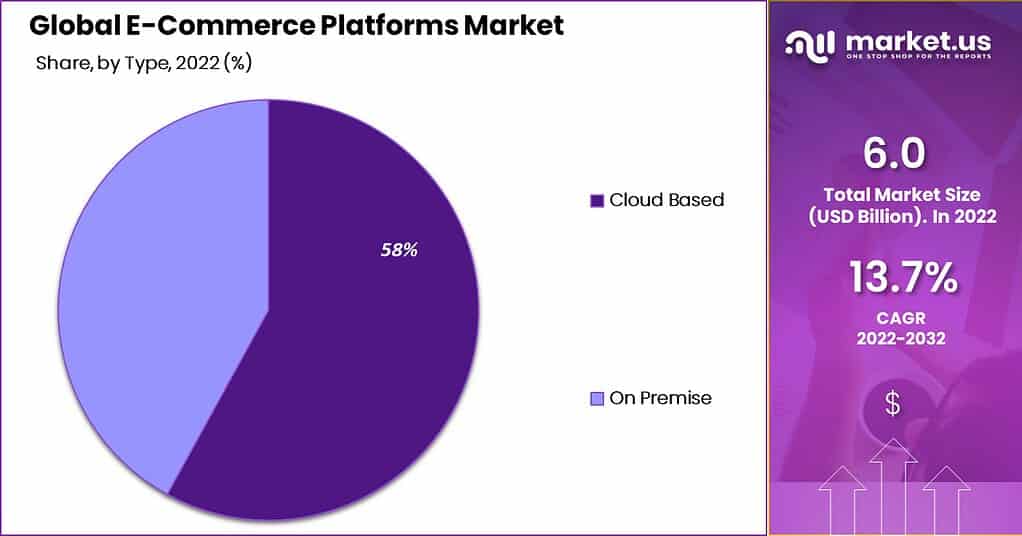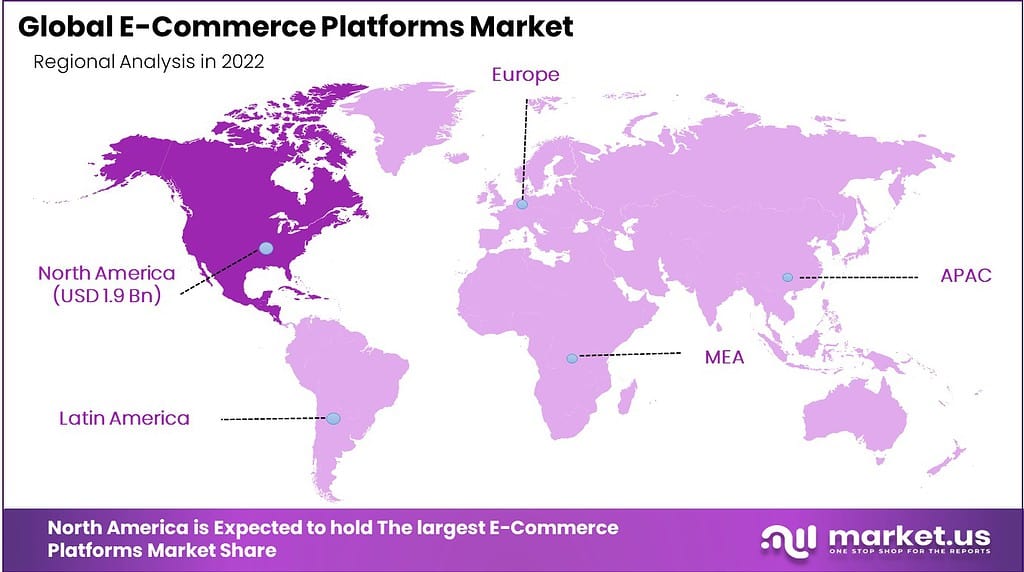New York, Jan. 22, 2024 (GLOBE NEWSWIRE) -- According to Market.us, The Worldwide E-Commerce Platforms Market is experiencing substantial growth, with a projected valuation of USD 21.0 billion by 2032, representing a remarkable CAGR of 13.7% from its 2023 value of USD 6.8 billion.
E-Commerce Platforms refer to digital solutions that empower businesses to establish and manage online stores, enabling the sale of products and services over the internet. These platforms offer a wide range of features, including website design, inventory management, secure payment processing, and customer relationship management. E-Commerce Platforms play a pivotal role in facilitating the growth of online businesses by providing the necessary infrastructure for effective online retail operations.
The E-Commerce Platforms market is a vibrant and rapidly evolving sector within the digital commerce landscape. It encompasses a diverse array of software and service providers, each offering unique solutions to cater to the diverse needs of online retailers. This market has witnessed substantial growth, fueled by the global shift towards online shopping. E-Commerce Platforms enable businesses of all sizes to reach a wider audience, streamline operations, and enhance customer experiences. With continuous innovations, integrations, and the incorporation of advanced technologies, the E-Commerce Platforms market is poised for further expansion as businesses continue to embrace digital commerce as a fundamental aspect of their operations.
Download Latest Analysis Sample PDF (Including Full Table of contents, List of Tables & Figures, Chart) @ https://market.us/report/e-commerce-platforms-market/request-sample/

The e-commerce platforms market has benefited from advancements in technology, such as cloud computing, artificial intelligence, and data analytics. Cloud-based e-commerce platforms offer scalability, flexibility, and cost-effectiveness, enabling businesses to quickly launch and scale their online operations. AI and data analytics capabilities embedded within e-commerce platforms provide valuable insights into customer behavior, enabling businesses to personalize marketing strategies, optimize product recommendations, and enhance the overall customer experience.
Key Highlights
- The E-Commerce Platforms Market is projected to reach a valuation of USD 21.0 billion by 2032, with a compound annual growth rate (CAGR) of 13.7% from its 2022 valuation of USD 6.0 billion.
- In terms of e-commerce models, Business-to-Customer (B2C) platforms dominate, offering personalized shopping experiences and convenience. Cloud-based platforms have also gained prominence, representing 58% of the market share, thanks to their speed and scalability.
- The application segment highlights the dominance of the Electrical & Electronics category, driven by the widespread adoption of electronic devices. Moreover, the integration of augmented reality in online shopping is poised to create lucrative opportunities in the market, enhancing the overall customer experience.
- Regionally, North America leads the market, fueled by the presence of major e-commerce companies, while Europe demonstrates significant growth due to supportive government initiatives and regulations. However, the Asia Pacific region is expected to exhibit the fastest CAGR, reflecting the rising adoption of online shopping in developing nations.
- Key players like Shopify, eBay, Amazon, Oracle, SAP, Salesforce, Magento, Ecwid, OpenCart, and PrestaShop are at the forefront, leveraging technological advancements and strategic collaborations to solidify their positions in this rapidly evolving market.
"Technological advancements have played a significant role in the growth of the E-Commerce Platforms market. Innovations in areas such as cloud computing, artificial intelligence, data analytics, and augmented reality have enhanced the capabilities of e-commerce platforms. These technologies enable personalized shopping experiences, targeted marketing campaigns, efficient inventory management, and streamlined order fulfillment, driving the demand for advanced e-commerce platforms." Says Mr. Yogesh Shinde Team Lead @ Market.us
Factors Affecting the Growth of the Global E-Commerce Platforms Market
The growth of the global e-commerce platforms market is influenced by several key factors. These factors shape the industry landscape and drive the adoption and expansion of e-commerce platforms worldwide. Here are some of the significant factors affecting the growth of the global e-commerce platforms market:
- Increasing Internet Penetration: The growth of e-commerce platforms is closely tied to internet penetration rates. As more regions and countries gain access to the internet, the potential customer base for online shopping expands. The increasing availability of affordable internet connections, coupled with the proliferation of smartphones and other connected devices, enables more people to engage in online transactions, driving the growth of e-commerce platforms.
- Changing Consumer Behavior: Shifting consumer preferences and behavior have played a crucial role in the growth of e-commerce platforms. Consumers are increasingly turning to online shopping due to its convenience, wider product selection, and competitive pricing. As consumers become more comfortable with online transactions and gain trust in e-commerce platforms, the market continues to expand.
- Mobile Commerce (m-commerce): The rise of mobile devices, such as smartphones and tablets, has fueled the growth of mobile commerce. Mobile apps and optimized mobile websites have made it easier for consumers to shop on the go, leading to increased mobile transactions. E-commerce platforms that provide seamless mobile experiences and responsive design have an advantage in capturing the growing m-commerce market.
- Technological Advancements: Advancements in technology have significantly impacted the growth of e-commerce platforms. Cloud computing, artificial intelligence, data analytics, and automation have enhanced the capabilities of e-commerce platforms, enabling better customer experiences, personalized marketing, efficient inventory management, and streamlined operations. The integration of emerging technologies continues to drive innovation in the e-commerce space.
Report Segmentation of E-Commerce Platforms Market
E-Commerce Model Analysis
In 2023, the Business to Customer (B2C) segment held a dominant market position in the e-commerce platforms market, capturing a substantial share. This dominance is largely attributed to the explosive growth in online retail shopping, driven by changing consumer behaviors and technological advancements. The B2C model, which facilitates the direct sale of products and services from businesses to end consumers, has become increasingly popular due to its convenience and efficiency.
The rise of digital and mobile technologies has played a crucial role in this dominance. With the proliferation of smartphones and improved internet connectivity, consumers have unprecedented access to online shopping platforms. This ease of access has led to a significant increase in the number of consumers shopping online, thus expanding the market for B2C e-commerce platforms.
Moreover, the B2C model has been bolstered by the integration of advanced technologies such as artificial intelligence (AI) and machine learning for personalized shopping experiences. These technologies enable e-commerce platforms to offer customized product recommendations, targeted marketing, and enhanced customer service, further attracting consumers to online shopping.
Another key factor contributing to the growth of the B2C segment is the broadening of product categories available online. Initially dominated by books and electronics, the range of products now spans across various categories including fashion, groceries, and services, making online shopping a one-stop solution for diverse consumer needs.
Get a glance at the market contribution of the segments, Request a PDF Sample
Type Analysis
In 2023, the Cloud-Based segment held a dominant market position in the e-commerce platforms market, capturing more than a 58% share. This leading stance is primarily due to the numerous advantages cloud-based solutions offer over traditional on-premise platforms. Key among these advantages is scalability. Cloud-based e-commerce platforms enable businesses to easily scale up or down their operations based on traffic fluctuations, a crucial capability in the dynamic online retail environment. This scalability is not as readily achievable with on-premise solutions, which often require significant upfront investment in infrastructure and hardware.
Another factor contributing to the dominance of cloud-based platforms is cost-effectiveness. These solutions typically operate on a subscription-based model, which reduces the need for large initial investments and lowers the barrier to entry for small and medium-sized enterprises (SMEs). In contrast, on-premise solutions can be cost-prohibitive for smaller businesses due to the high costs associated with purchasing and maintaining servers and other hardware.
Moreover, cloud-based platforms offer enhanced flexibility and accessibility. They allow businesses and consumers to access the e-commerce platform from anywhere, at any time, provided there is internet connectivity. This ubiquity is particularly advantageous in today's increasingly mobile world. On-premise solutions, on the other hand, are often restricted to specific physical locations.

Application Analysis
In 2023, the Electrical & Electronics segment held a dominant market position in the e-commerce platforms market, capturing a significant market share. This prominence can be attributed to several key factors. Firstly, the global surge in demand for consumer electronics, driven by technological advancements and the increasing reliance on digital devices in daily life, has significantly boosted this sector. Smartphones, laptops, home appliances, and other electronic goods have become indispensable, leading to a robust online market presence.
The consumer shift towards online shopping, accelerated by the COVID-19 pandemic, further fueled the growth of this segment. Consumers increasingly prefer the convenience and variety offered by e-commerce platforms for purchasing electronic items. The ability to compare specifications, prices, and read reviews has made these platforms especially appealing for purchasing high-value items like electronics.
Additionally, the rise in Internet penetration and the proliferation of smartphones have expanded the consumer base for online electronic shopping, particularly in emerging economies. This expansion is complemented by the growing trend of tech-savvy consumers who are comfortable with online purchases.
Buy Now this Premium Report to Grow your Business: https://market.us/purchase-report/?report_id=53872
Competitive Landscape
The competitive landscape of the market has also been examined in this report. Some of the major players include:
- Shopify
- eBay
- Amazon
- Oracle
- SAP
- Salesforce
- Magento
- Ecwid
- OpenCart
- PrestaShop
- Other Key Players
Key Market Segments
E-Commerce Model
- Business to Business (B2B)
- Business to Customer (B2C)
Type
- Cloud-Based
- On-Premise
Application
- Fashion & Apparel
- Electrical & Electronics
- Food & Beverage
- Health & Beauty
- Other Applications
Regional Analysis
In 2023, North America held a dominant market position in the Big Data as a Service (BDaaS) market, capturing more than a 32.8%. share. This leading position can be primarily attributed to the region's advanced technological infrastructure and the presence of major industry players. North America, especially the United States, has been at the forefront of technological innovation, with a strong focus on data analytics and cloud computing. This environment has fostered the growth of BDaaS, providing businesses with sophisticated analytical tools and large-scale data processing capabilities.
The high adoption rate of big data technologies in North American enterprises, driven by the need to gain competitive advantages through data-driven decision-making, has significantly contributed to the market's growth. Industries such as healthcare, retail, and finance in this region have been particularly quick to adopt BDaaS solutions to improve operational efficiency and customer experiences.
Furthermore, the region's regulatory landscape, with policies encouraging data protection and privacy, has prompted companies to invest in secure and compliant BDaaS solutions. This regulatory environment has boosted confidence in adopting BDaaS among various sectors, further propelling market growth.
In terms of market data, the BDaaS market in North America is projected to grow at a compound annual growth rate (CAGR) of approximately X% over the next few years. This growth is supported by the increasing amount of data generated by businesses, the ongoing digital transformation across industries, and the rising demand for cloud-based analytics.

By Geography
- North America
- The US
- Canada
- Europe
- Germany
- France
- The UK
- Spain
- Italy
- Russia
- Netherland
- Rest of Europe
- APAC
- China
- Japan
- South Korea
- India
- Australia
- New Zealand
- Singapore
- Thailand
- Vietnam
- Rest of APAC
- Latin America
- Brazil
- Mexico
- Rest of Latin America
- Middle East & Africa
- South Africa
- Saudi Arabia
- UAE
- Rest of MEA
Browse More Related Reports
- Digital Music Content Market is anticipated to be USD 54.5 billion by 2033. It is estimated to record a steady CAGR of 9.5%.
- K-12 Education Technology Market is anticipated to be USD 8,759.5 Mn by 2032. It is estimated to record a steady CAGR of 21.3%
- Generative AI in Clinical Trials Market is expected to reach a substantial worth of around USD 1,122 Mn by 2032, significant CAGR of 23.8%.
- Power Electronics Market will exceed USD 94.21 billion by 2032 with a projected compound annual growth rate (CAGR) of 8.3%.
- Europe Recruitment Marketing Platform Market is projected to be US$ 324.8 Mn in 2022 to reach US$ 517.8 Mn by 2032 at a CAGR of 8.2%.
- Industrial I/O Modules Market size is expected to be worth around USD 3104.87 Mn by 2032 from USD 1,766.8 Mn in 2022, growing at CAGR of 5.8%.
- Remote Sensing Technology Market size is expected to be worth around USD 61.7 Billion by 2032, record a steady CAGR of 19.0%.
- Email Marketing Market is booming, with a global size of USD 7.4 billion in 2022 and expected to reach USD 46.9 billion by 2033
- Video Wall Market was valued at USD 6,870.3 Mn in 2022 and is projected to increase significantly USD 18,965.6 Mn in 2032.
- Cryo-Electron Microscopy Market size is expected to be worth around USD 1.6 billion by 2032 from USD 724.2 million in 2022, growing at a CAGR of 8.7% during the forecast period from 2023 to 2032.
- Hard Disk Drive Market is expected to grow at a CAGR of roughly 5.3%. It will reach USD 114.5 Bn in 2032, from USD 68.3 Bn in 2022
- Application-Specific Integrated Circuit Market was worth US$ 15,214 million in 2021 & expanded by at 6.8% CAGR between 2022 and 2031
- BYOD Market size is expected to be worth around USD 1,122,917.37 mn by 2032 from USD 277,568 million in 2022, growing at a CAGR of 15%
- Consumer Network Attached Storage Market size is expected to be worth around USD 19346.52 million by 2031, growing at a CAGR of 17%
About Us
Market.US (Powered by Prudour Pvt Ltd) specializes in in-depth market research and analysis and has been proving its mettle as a consulting and customized market research company, apart from being a much sought-after syndicated market research report-providing firm. Market.US provides customization to suit any specific or unique requirement and tailor-makes reports as per request. We go beyond boundaries to take analytics, analysis, study, and outlook to newer heights and broader horizons.
Follow Us On LinkedIn Facebook Twitter
Our Blog:
